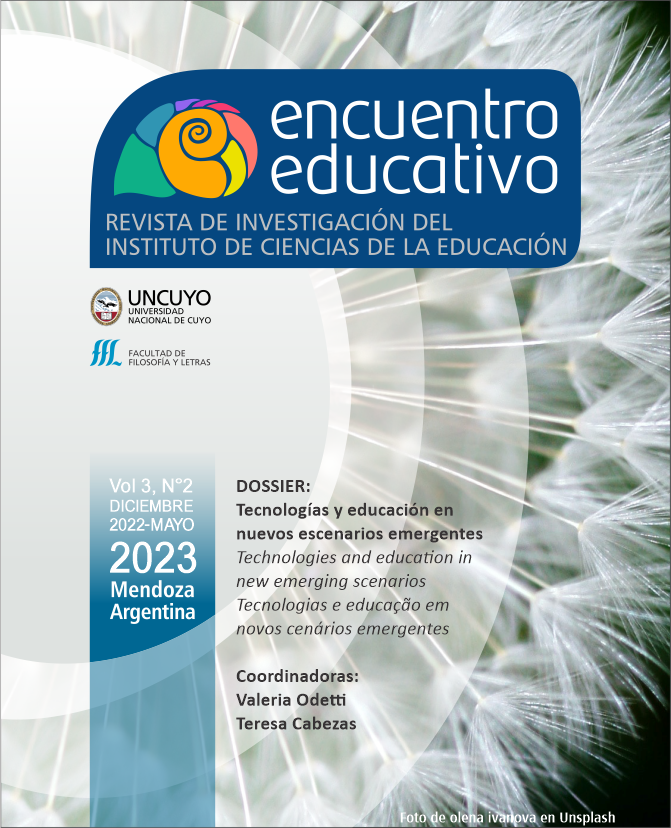Virtual scenario of expanded learning in social networks
Keywords:
virtual learning scenario, , design research;, open learning, expanded classroomAbstract
The purpose of the paper is to communicate the results that are part of the research project ‘Virtual learning scenarios at the university. Research based on the design of alternative educational proposals’, in which virtual learning scenarios defined as the combination and integration of personal and institutional environments (virtual classrooms) and social networks are studied. This integration is proposed as an alternative to e-learning practices generally focused on virtual environments created on institutional platforms. The article presents the characteristics of the virtual learning scenario, prepared for a postgraduate career in university teaching, and analyzes the results that refer to the expansion of the virtual classroom with the
use of social networks integrated into the training proposal. Results are also presented on the evaluations of the teaching staff and on the projections towards their teaching practice. Methodologically, the framework project is defined by design-based research, which admits a diversity of methods and techniques for data collection during the implementation phase. In the case of the objective that investigates the expansion of the virtual classroom, we worked with the analytics that the social networks used and with the questionnaires applied to the teachers participating in the training proposal. The analysis allowed us to determine the expansion of the virtual environment, its expansion towards other communication
and knowledge environments. Favorable perceptions were obtained from teachers
towards the use and expansion of learning environments through social networks, and incipient pedagogical projections closely linked to the forms of participation they had in the networks were discovered. In the conclusion, it is postulated that in order for online learning to take place, techno-pedagogical designs that promote
open, flexible, diverse and autonomous learning are required, which in turn requires a virtual scenario edited on a porous platform, expanded, converged and entangled with other platforms.
References
Adell Segura, J. & Castañeda Quintero, L. (2010). Los Entornos Personales de Aprendizaje (PLE): una nueva manera de entender el aprendizaje. En R. Roig Villa & M. Fiorucci. (Eds.) Claves para la investigación en innovación y calidad educativas. La integración de las Tecnologías de la Información y la Comunicación y la Interculturalidad en las aulas. Universitá degli studi
Argentina.gob.ar. (2022). Métricas en redes sociales. Jefatura de ministros https://www.argentina.gob.ar/jefatura/innovacion-publica/servicios-y-pais-digital/pais-digital/estrategias-de-marketing-digital-1
Castells, M. (2006). La sociedad red: una visión global. Alianza Editorial.
Cobo, C. (2016). La Innovación Pendiente. Reflexiones (y Provocaciones) sobre educación, tecnología y
conocimiento. Colección Fundación Ceibal/ Debate: Montevideo.
Data Reportar. Digital 2021: Informe general global https://datareportal.com/reports/digital-2021-globaloverview-report
Downes, S. (11 de julio de 2013). La condición semántica: conectivismo y aprendizaje abierto. [Videoconferencia]. IBERTIC, Metas 2021 OEI. Buenos Aires. https://www.youtube.com/watch?v=Oth_9v3RcuI
Gros, B. (2015). La caída de los muros del conocimiento en la sociedad digital y las pedagogías emergentes. Education in the Knowledge Society [en línea]. 2015, 16(1), p. 58-68
https://www.redalyc.org/articulo.oa?id=535554757005
Gutiérrez, L. (2012). Conectivismo como teoría de aprendizaje: conceptos, ideas y posibles limitaciones. Revista educación y tecnología, (1), p.111-122. http://revistas.umce.cl/index.php/edytec/article/view/39
Instituto Nacional de Formación Docente. (12 de octubre de 2022). Educación y Tecnologías digitales para el nivel secundario [Archivo de Vídeo]. Youtube. https://www.youtube.com/watch?v=sJACj0HjTqk
Marcelo, C., y Marcelo, P. (2021). Influencers educativos en Twitter. Análisis de hashtags y estructura
relacional. Comunicar, 68, 73-83. https://doi.org/10.3916/C68-2021-0
Prieto Castillo, D. (19 de octubre 2007). En torno a las experiencias pedagógicas decisivas. [Conferencia principal] Conferencia del Encuentro de maestros de Las Heras, Mendoza, Argentina.
Rinaudo, M. (4 de octubre de 2018). Perspectivas en investigación educativa: la investigación basada en diseño. [Conferencia plenaria] Conversatorio Perspectivas en investigación educativa. ICE. Fac. de Filosofía y Letras. UNCuyo, Mendoza, Argentina.
Rinaudo, M. C. & Donolo, D. (2010). Estudios de diseño. Una perspectiva prometedora en la investigación educativa. RED. Revista de Educación a Distancia, (22), p. 1-29.
https://www.redalyc.org/articulo.oa?id=54715149003
Salinas, J. (2016). La investigación ante los desafíos de los escenarios de aprendizaje futuros. RED. Revista de Educación a Distancia, (50), p. 1-24. https://www.redalyc.org/articulo.oa?id=54746291014
Shwartzman, G.; Tarasow, F. y Trech, M. (2014). De la educación a distancia a la educación en línea: aportes a un campo en construcción. Homo Sapiens.
Siemens, G. (2004). Conectivismo: una teoría de aprendizaje para la era digital. Traducción de Diego E. Leal Fonseca. https://docplayer.es/75071865-Conectivismo-una-teoria-de-aprendizaje-para-la-era-digital%20.html
Downloads
Published
How to Cite
Issue
Section
License
Copyright (c) 2022 Elena Barroso, Teresa Cabezas, Carolina Gómez

This work is licensed under a Creative Commons Attribution-NonCommercial 4.0 International License.













